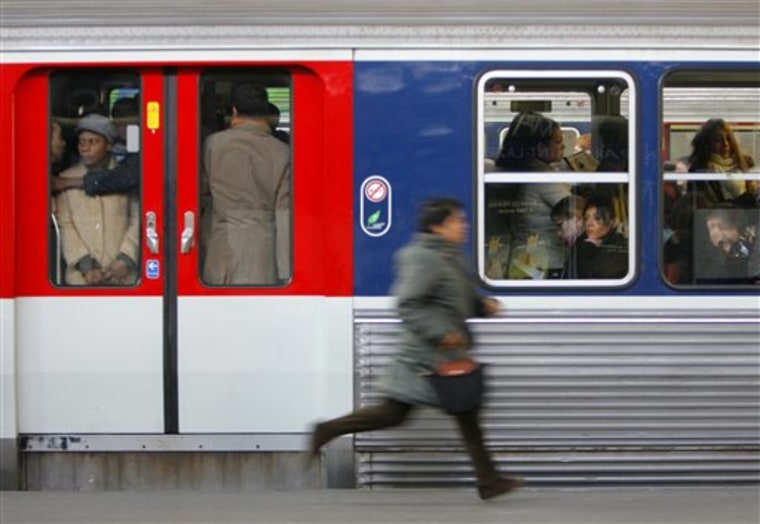Transport workers voted Friday to keep a national strike going through the weekend over President Nicolas Sarkozy's plans to strip away generous pension benefits, union officials said.
But the impact of the strike diminished as nearly 68 percent of drivers for the national rail network ignored it and went to work, up from 40 percent on Wednesday, the first full day of the strike.
National rail operator SNCF said about 260 high-speed trains were operating, far fewer than the 650-700 on normal days but up from 150 on Thursday. Highways were only slightly busier than normal, the national highway information office said.
SNCF executive director Guillaume Pepy said Friday that "some uncontrollable strikers — or outside elements" were blocking trains by lighting fires or setting off firecrackers. He called such unrest "scandalous and absolutely unacceptable."
Only two subway lines in Paris were closed completely, and about one in three buses were running on average. Some trains were running on four of the five RER commuter rail lines.
Several unions for both SNCF and the Paris transit authority RATP — which includes subways, buses and the suburban RER trains — agreed to press on with the strike through Monday, labor officials told The Associated Press.
Unions began the walkout late Tuesday to protest Sarkozy's plans to end some benefits for train drivers and some other state employees. Sarkozy's image as a reformer who has pledged to modernize France to better compete in the global economy depends on his not caving into the pressure, the biggest labor test of his six months in office.
Sarkozy has agreed to a leading union's call for negotiations between workers and managers, under government sponsorship. Unions want to continue the walkout during negotiations but the labor minister said the government would not lead any talks until the strike ends.
Many commuters again had to walk, bicycle or roller-skate, or gamble on getting on one of the reduced number of buses, trains or subways operating across the country.
Some sided with Sarkozy, saying the reforms are needed, and decried the daily hassles caused by the strike.
"You have to do a lot of walking, spend a lot of time in train stations waiting, and running left and right" to catch trains, civil servant Pascale Mathieu said as he waited for a train to the suburbs at Saint-Lazare station in Paris. "To avoid being late for work, you have to leave earlier — it's really troublesome and bothersome."
Late Thursday and early Friday, riot police evicted students who were staging sit-ins at university campuses in the capital and in the cities of Strasbourg, Lyon and Nantes to protest a reform that allows for private, charitable contributions to schools — in addition to public funding and tuition charges.
The students fear the reform, designed to make France's schools more competitive, will erode the national guarantee of public education for all.
Five people were detained by police in a scuffle early Friday at a university in southern Montpellier, National Police spokesman Laurent Ricard said.
Next week, many student unions plan to line up with hospital workers and school administrators in strikes over Sarkozy's plan to thin the public sector.
